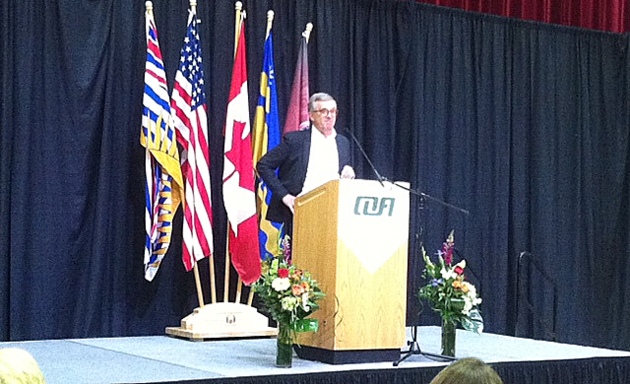Lessons To Be Learned From Tsilhqot’in Decision

Geoff Plant addresses delegates at the 2015 COFI convention 250News photo
Prince George, BC – Lawyer, and former BC Attorney-General, Geoff Plant, is calling on the provincial government and forest industry to see the “opportunity” presented by the landmark ruling in favour of the Tsilhquot’in First Nation…
Last June’s unanimous 8-0 ruling issued by the Supreme Court of Canada granted the Tsilhquot’in aboriginal title to 17-hundred square kilometres of land west of Williams Lake.
Speaking to delegates at the Council of Forest Industries convention in Prince George yesterday, Plant said it’s time to jump over the ‘wall of denial of aboriginal title’ and let reconciliation be our guiding principle.
“I think we’ve got a chance as British Columbians – as Canadians – to finally test out: what do we mean to truly recognize and affirm aboriginal rights and title?”
Plant said the reality of the SCOC decision is that vast tracks of BC could be claimed as aboriginal title. While acknowledging the uncertainty that presents, he said we have a window of opportunity now that is really only due to a willingness on the part of First Nations to negotiate, rather than litigate.
He said the ruling does allow the Province to infringe on that title if it has justification, but just what meets that test is less clear. In the case of the Tsilhquot’in, commercial logging did not.
“The one I like to use just hypothetically is, ‘What if you were building a hydroelectric dam that could hypothetically supply eight-percent of the electrical power needs of the province of British Columbia for generations to come?'” queried Plant. “Would that be a compelling and substantive objective? It’s a pretty good argument, we don’t yet know for sure.”
Plant said it’s time for government and business to earn that certainty. He said reconciliation is at the heart of what the law requires and should be the objective of public policy and business deals, as well. He called on the provincial government to ‘truly step up and take the lead’ in the process, saying it’s in the best position to provide the framework for the process.
And Plant defended the BC treaty process saying while it hasn’t achieved the original goal of having dozens of treaties in place by now, instead of just a handful, it has created the opportunity for government and First Nations to sit down regularly. Prior to the process, the retired politician pointed out those opportunities would often only happen after a roadblock. With the provincial government pondering the future of the process, Plant said he’s not sure how the two sides will keep talking to one another.
As for business, Plant said it has an important role to play at the table, figuring out what forest policy looks like, post-Tsilhquot’in.
“We can’t have one-size-fits-all frameworks in a province that has 200 different First Nations – all with different aspirations and visions,” he said. “But we do need to have…some discipline around the process of engagement.”

Comments
Lesson learned from Plant: Leave government and peddle influence for a living. Yeah right.
Great minds like Mr. Plant’s shouldn’t be restricted by the short-sighted thinking of government. Good for him he got out when he could, rather than keeping his snout at the trough like the rest of them.
Comments for this article are closed.